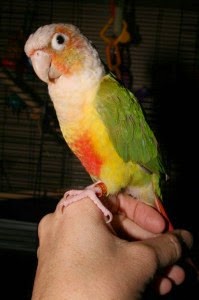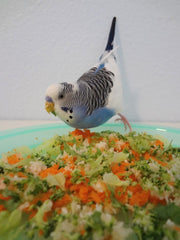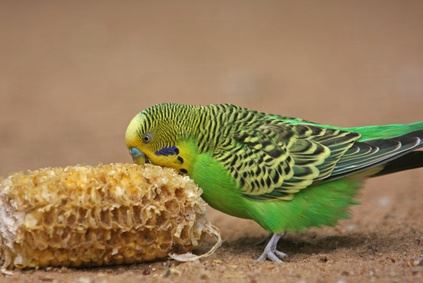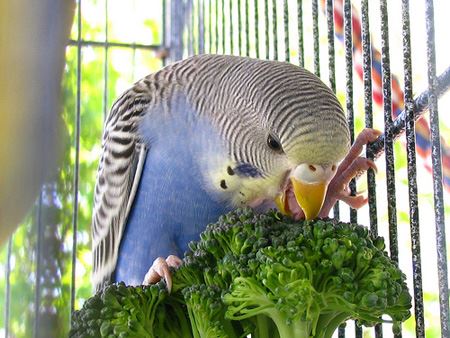Help! Why Isn't My Parrot Eating? Learn Why Pet Birds Stop Eating & Drinking Properly Plus How to Reverse It
Has your beloved parrot abruptly stopped eating for no apparent reason?
Whether you own a large African Grey, Macaw, or a small parakeet, all pet parrots need to consume food and water on a daily basis to ensure proper health and development.
When your bird stops eating or drinking, their health will gradually decline while their bodies become weaker and weaker.
But what factors are known to cause this behavior? And how can concerned owners like you encourage parrots to eat again?
Read on to find out...
Common Causes & Why You Shouldn't Ignore This Behavior
When a parrot suddenly stops eating their food, it's usually a sign of a more serious underlying problem...
Parrots are creatures of habit and some are extra picky by nature and will only eat a certain type of food. So seeing your parrot not eating is not always a cause for concern.
However, when they stop eating ALL of their food, you must quickly act to identify the problem.
Turning a blind eye to your parrot's malnutrition will lead to the deterioration of his or her health.
Whether your parrot is a baby, new to your family, or a longterm resident of your flock—and whether they are small, medium or large—you must ensure they are eating food on a daily basis.
Stress From a New Environment
One of the most common reasons why pet parrots don't eat is because they're suffering from the stress of being in a new environment.
If you recently brought them home from the rescue center, pet store, or breeder, there is a good chance this is the root cause of their behavior.
You have to remember that moving into a new home is a big change for a parrot; they'll have new sights, sounds and smells—some of which can seem rather threatening at first.
The good news is that most parrots will naturally ease into their new home and start eating and drinking normally within a couple of days.
Owners should pay close attention to their parrots during the first 24-48 hours, observing how much—if any—food they are eating.
If your parrot hasn't started eating or drinking properly by the third day, you'll want to take them to an avian veterinarian to ensure there's not a more serious underlying problem at hand.
Only then will you be able to professionally diagnose your bird's condition.
Depending on what other symptoms your parrot is experiencing, an avian veterinarian may want to perform a fecal and/or blood test to rule out common parasites and infections.
It's not uncommon for parrots to catch an infection that causes them to temporarily stop eating.
Thankfully, a round of antibiotics will wipe out some of the most common forms of infections. Listen to your veterinarian and follow their advice step by step.
New Type of Food That Doesn't Agree With Them
Of course, another common reason why some parrots stop eating is that they are introduced to a new type of food.
It is possible that finicky birds will do more playing with their new food than consuming it like you had planned...
If a parrot has been eating the same food for several months or longer, they'll probably be hesitant when you try to switch their imbalanced diet to a new type of food.
This is why most avian veterinarians recommend owners to continue feeding their parrots a similar diet throughout their life.
Any major modifications to their diet should be made gradually over a period of days or weeks by slowly introducing the new grub into their routine.
Observe Your Bird's Surroundings Closely
First and foremost, carefully look over your parrot's cage to see what they are doing with the food. For instance, your parrot could be eating the insides of their seed mix and spitting out the shells.
If this is the case, your bird is perfectly fine and should cause no reason for concern. Other picky parrots will play with and selectively choose certain pieces of food from a seed or pellet mix.
Until you are able to take your parrot to the veterinarian, you can try feeding them some soft foods through a plastic syringe. Here's a post explaining about your parrot's diet- transitioning, pellets and foods to avoid.
Stick To The Favorites
If your parrot has a favorite fruit or vegetable, which most do, mash it up and place it inside a syringe. Gently press the syringe in your bird's mouth to see if they are willing to swallow any of it.
Even if they swallow just a single mouthful, it's still a beneficial boost of energy and nutrition that will likely help them recover from their illness.
Likewise, every sip of water will boost their hydration levels.
How To Handle Baby Birds' Needs
For baby birds you are handfeeding, make sure the formula is at the right temperature and properly mixed each time. Inconsistencies in the mixture can cause them to refuse it.
Also, keep track of a young bird's age because they could be ready to move on to solid food which they will eat on their own instead of being handfed.
Making The Switch
Switching your parrot from a seed-based diet to a pellet-based diet is yet another factor that may cause them to stop eating.
Seeds are natural and easy to come by in the wild, while pellets are formulated with nutrients and protein before being shaped into convenient, easy-to-eat balls.
Once you place a bowl of pellets in front of a parrot who's used to eating seeds (even if they a premium brand), the parrot may not eat it at first.
The bottom line is that owners should continue feeding their parrots the same type of food throughout their life unless otherwise advised by an avian veterinarian.
Can Parrots Overeat?
Overeating is a serious problem that can lead to obesity in any animal. The short answer to this question is yet, parrots -- like every other animal on earth -- can overeat.
Some owners may brush this behavior off as nothing more their feathered friend being exceptionally hungry, but in reality it's a serious condition that can have some detrimental effects on a parrot's health and overall well-being.
Why Parrots Overeat
Parrots may overeat for a number of different reasons, one of which is boredom. When a pet bird is bored and/or not receiving stimulation in its current environment, it may eat for the sole purpose of filling this void.

This is particularly problematic in homes where parrots are left alone for days on end, with owners giving them little-to-no attention.
Birds are highly social creatures and crave the attention of others. Owners who fail to provide their companions with the necessary stimulation they crave may cause them to overeat.
If a parrot is suffering from a parasite, he may overeat as well. Parasites tend to leach the nutrients out of the parrot's system; thus, causing him to overeat in an attempt to make up for the lost nutrients.
Another reason why they may overeat is that they were previously malnourished.
When an abused or neglected parrot is brought into the care of an avian foster home, she may overeat simply because she is weak and malnourished.
This, of course, is more of a problem in abused and neglected parrots than well-cared-for family pets.
Why Excess Consumption Is Bad
Overeating can lead to obesity, disease, illness, and it can shorten your parrot's life. The excess food will add unnecessary weight to your parrot, promoting the formation of fat which compresses against their vital organs and blood vessels.
Subsequently, this increases the risk of certain diseases and conditions, including heart disease, diabetes (yes, parrots can be diabetic), cancer, and more.
How To Stop Your Parrot From Overeating
If your bird is overeating, you should first have them examined by a licensed avian veterinarian. He or she will conduct a thorough examination to ensure your feathered friend isn't suffering from any parasites or diseases that may be causing them to overeat.
Assuming your parrot is healthy, your veterinarian may recommend a new food variety and/or feeding your birdie less food.
Time To Help Your Birdie To Eat Up!
So while seeing that your bird is not eating and drinking can be scary at first, there are steps you can take to remedy their behavior.
The important thing is to carefully observe your parrot for what could have caused the situation in the first place.
Then, consult with your vet if you can't get your bird to resume eating and drinking normally again with the tips above.
Have you dealt with a parrot that stops eating or overeats? Let us know what worked for you in the comments section below!




My parrot has’nt eat any thing. Also started loos motion. Please tell me the remedies
My parrot doesn’t eat anything
My 2 month old Indian ringneck hasn’t been eating for three days. He take a bite or two and then starts spitting it if I give him more. The vet gave em meds for intestinal problems but theyve had no effect.
My parrot is unable to eat, though he wants to ,because the lower jaw area of is hurting him while he is chewing.